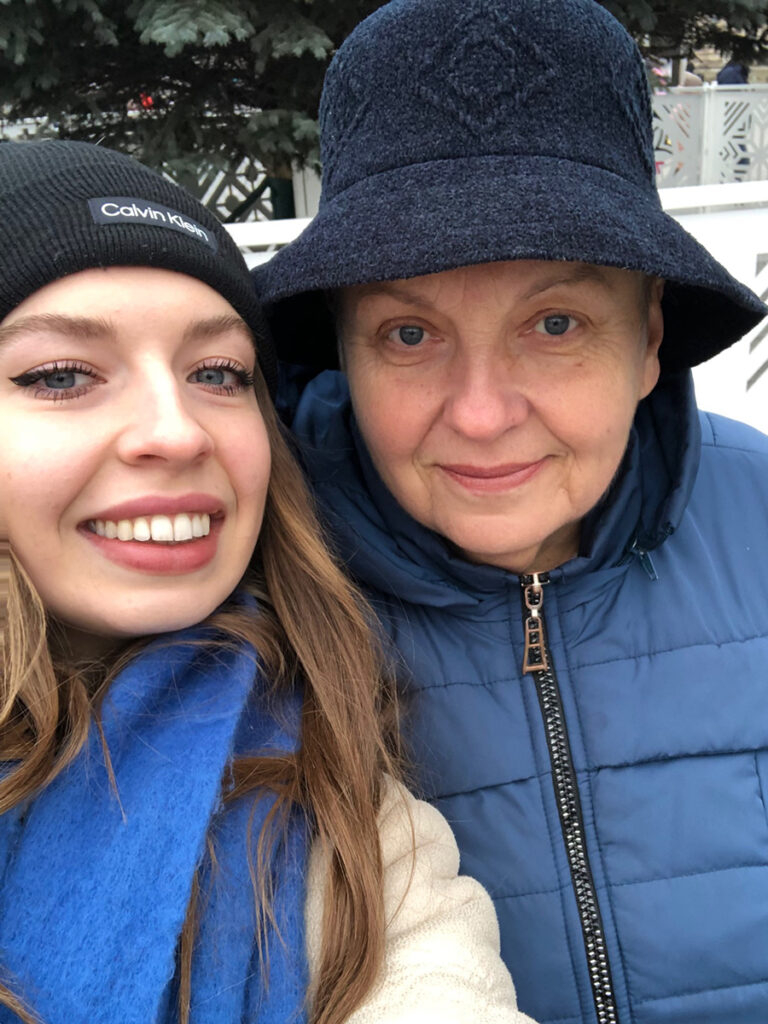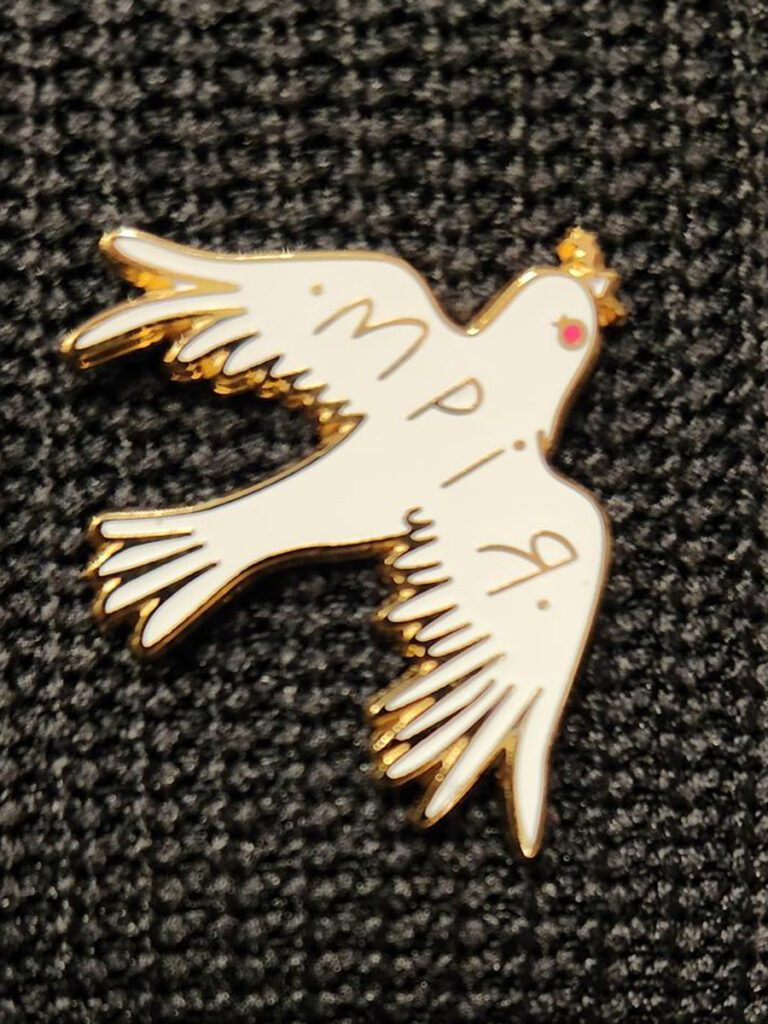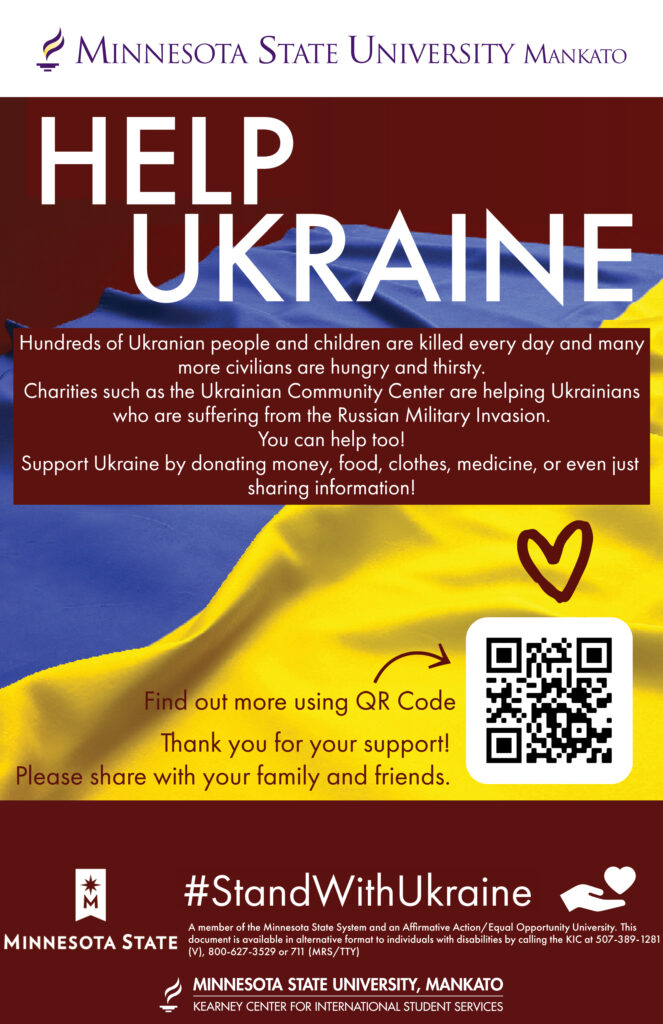by LENNY KOUPAL, CSU Communications Coordinator

Dariia Hozhenko is living on the edge of two very different worlds.
On one side is college life. On the other side is family and friends caught in the midst of war.
A physics graduate student and teaching assistant at Minnesota State Mankato, Dariia now has a deeper understanding of that vantage point after returning from Ukraine over the winter break.
It was always part of her and her mother Olga’s plan. Half-way through her graduate program, she would return home to Ivano-Frankove, a small city near Lviv in western Ukraine.
War wasn’t part of that plan.
“Then Russia invaded Ukraine and all of these things happened,” she said.
Back home, her world was literally thrust into darkness. There’s no water and electricity except for, maybe, two hours a day. The unpredictable blare of air raid sirens obliterates daily routine. When it came to returning home, it seemed obvious there was nothing more to talk about.
“I will not go,” Dariia recalled thinking last fall.
Despair turned into determination when she learned of others traveling to and from Ukraine despite the ongoing war.
“If they can do it, I can do it. I booked a ticket,” she added.
‘You would never understand how it was to wake up from bombing if you will not have something like that happen in your life.’
DARIIA HOZHENKO
Leaving Minneapolis on Dec. 7, Dariia traveled to Krakow, Poland. It took three days to travel the remaining 200 miles home–10 hours of that spent in a bus 100 feet from the Ukrainian border.
When she finally crossed into Ukraine, war was evident.
“As soon as you cross the border, there’s darkness. Everywhere darkness,” was Dariia’s initial reaction.
Traveling in the dead of night in a homeland now under mandatory curfew between 11 p.m. and 5 a.m., Dariia asked the driver to let her off along the side of the highway near her home. It was 3 in the morning. She realized her phone no longer worked in Ukraine, so the driver called her mother with Dariia’s location.
Alone except for trucks delivering humanitarian aid, Dariia waited as a lone car drove by, turned around and pulled alongside her on the side of the road.
“He rolled down his window and said, ‘Do you need a ride?’ I just started to cry.”
Through her tears, Dariia asked if she could use his phone, but she started backing up when he stepped from his car and approached her.
“He said, ‘Don’t be scared’ and handed me his phone,” Dariia said.
She called her mom who was just minutes away. He stayed with her until her mom arrived.
The effects of war were quickly realized. With virtually no electricity, candles were used to warm water for tea. Gas and groceries were “super expensive.” Grocery stores buying fuel-powered generators passed along costs. An agriculture-based country stripped of resources meant high mark-up on vegetables and other produce.
But the greatest realization was that nothing compares to the terror of war.
“You would never understand how it was to wake up from bombing if you will not have something like that happen in your life,” she said.
Dariia recalled one instance when her mother was retrieving the family’s dog, Charlik. As she was returning, a missile strike began about 500 meters from their home. Running barefoot into the winter cold, Dariia was screaming for her mom and Charlik to race back to their house. The three scrambled into a tiny food cellar that now serves as their bomb shelter.
“I can’t even explain–it’s like as an animal, you’re that scared. You start running. We jump into the shelter. I’m in my pajamas. Without any shoes, any socks. Straight to the shelter, the cold shelter,” Dariia said.
While in Ukraine, Dariia traveled by train to Kyiv to get her undergraduate and graduate documents from the National Aviation University.
Stepping off the train, Dariia wondered about the residents of familiar nearby apartment buildings now damaged by missile attacks.
“As soon as you get out of the rail station, there are a couple of buildings without apartments…just holes. Not even walls. Just nothing,” she said.
‘They’re inside of hell. And they can’t leave.‘
DARIIA HOZHENKO
“It was very scary. In Kyiv, they closed the subway while I was there. It was very bad. They allowed people to go in because it is shelter. But there were no trains,” Dariia said about Kyiv bombings over the holidays. “Everything was closed. The streets, everything. It was like, you know, greetings from Russia.”
While in Kyiv, she was able to locate college friends and visit some of her favorite sites. The day after retrieving her documents, the university was bombed.
Now back in Minnesota, Dariia said she is able to see things more clearly. Things are so relative after being in Ukraine.
“My mom and I had this rough conversation about her leaving Ukraine. I was begging her, ‘please.’ she told me, ‘I can’t.’ Her house, dog, chickens–she has 10 chickens,” Dariia said. “It is their home. It’s everything they have. It’s their life. Being here (in the U.S.), it seems so silly. But there…can you imagine if someone took everything away from you and that you’re just standing in pajamas? They’re inside of hell. And they can’t leave.”
Dariia said the holidays in Ukraine were obviously different than any Christmas season she had previously experienced. Known among its neighbors for its festive Christmas traditions, Ukraine’s colorful holiday celebrations were replaced by the darkness of war. No electricity meant no traditional Christmas eve dinners cooked with oats, raisins and poppy seed. Candlelight dinners are different when candles are the only source of light. Destruction always sat in the back of one’s mind.
Dariia added that growing poverty is being compounded by nationwide rationing to support the war effort.
‘Young boys are dying. Younger than me. Neighbors. Friends.’
DARIIA HOZHENKO
“People are not buying shoes because they don’t have money and even if they have something they will give it to the needs of the army to protect those other guys,” she said. “Those young guys who are on the front line and they’re dying every day. You can’t have joy when you’re going to the church because they brought someone. Young boys are dying. Younger than me. Neighbors. Friends.”
From her shared experience, she seeks empathy–not for her, but for those in the midst of an unprovoked war.
“When people say war, here, they think two sides are fighting for something. People were peacefully sleeping when Russia started to bomb us. Russia is still doing that,” she said. “I want them to remember that people are dying every day. Just try to imagine how that is to have, every day, inside a war, trying to plan your day, but you just can’t.”

By touching that empathy, Dariia hopes for continuing social, political and financial support for the people of Ukraine.
“You’re doing investment into global democracy and security,” Dariia said. “That people would understand that it’s not OK to invade someone. It’s not OK to kill people. It’s not OK to lie. You’re protecting the whole world saying that we will stand and help those who are fighting and dying for their freedom.”
Still, for Dariia, going home had one immeasurable source of joy. Fulfilling her and her mother’s plans to reunite well before their world changed.
“For me, everything was joyful. You know. Everything,” Dariia said. “I don’t care where and how, but just be together. I think it’s a little bit different because we are living so far away from each other and we didn’t see each other for such a long time. I was hugging her and I was thinking: remember this, remember this, you know. So everything, everything, was a wonderful moment for me.”
It put a whole new level of appreciation as she joined other students returning to college from winter break.
“Hug and kiss your family. There are a lot of people who physically can’t. To say I love you. Thank you. You’re important to me. I appreciate what you’re doing for me,” Dariia shared. “Because tomorrow might be different.”

